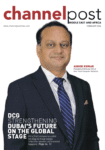Deloitte Middle East presented the key findings of its 2024 CxO Sustainability Report at a special roundtable during the second edition of the Future Sustainability Forum, held at Madinat Jumeirah on December 4 and 5.
As a Platinum Sponsor of the Forum, Deloitte played a central role in the event, which brought together visionaries, innovators, and change-makers from around the world to address pressing environmental challenges under the theme “Shaping Greener Economies.” Organized by Dubai International Financial Centre (DIFC), the Forum served as a platform for exploring sustainability solutions, including renewable energy, circular economy practices, and climate resilience.
During the roundtable, Deloitte leaders joined other key stakeholders to discuss actionable strategies for achieving Net-Zero goals by 2050 and highlighted the importance of collaboration between governments, businesses, and communities to drive meaningful impact.
Key findings from the report
The report, based on a survey of over 2,100 C-suite executives across 27 countries – including CEOs, CSOs, CFOs, CTOs and other CxOs – highlights a significant shift in corporate priorities. Notably, 92% of global executives believe their companies can achieve growth while reducing greenhouse gas emissions, signaling a widespread recognition of the alignment between business success and climate action.
Middle Eastern businesses are leading the way in climate action, with 54% reporting a complete transformation of their business models to embed sustainability into their core strategy, surpassing the global average of 45%.
A remarkable 85% of global CxOs reported an increase in sustainability investments, up from 75% last year. In the Middle East, 66% of organizations have slightly increased their investments, with 19% significantly boosting their sustainability budgets by 20% or more, outpacing the global trend.
The report reveals that climate change remains a top priority for CxOs, with 70% expecting it to significantly impact their strategies and operations over the next three years. In the Middle East, this figure rises to 73%, reflecting a heightened awareness of climate-related challenges in the region. Additionally, 43% of Middle Eastern executives ranked climate change as one of the top three most pressing issues for the upcoming year, surpassing the global average of 37%.
Sixty-seven percent of Middle Eastern executives also emphasize the importance of climate equity in their sustainability efforts, focusing on workforce retraining for green jobs and engaging vulnerable communities.
Innovation, including artificial intelligence (AI), ranks as the most pressing challenge for CxOs, with 38% listing it among their top three concerns. The report highlights that 50% of CxOs have already implemented technology solutions to achieve environmental goals, with another 42% planning to do so within two years. Among leading organizations, 85% are developing new climate-friendly products or services, emphasizing the link between innovation and climate action.
Despite recognizing the looming impact of climate change, 27% of organizations have taken minimal or no “needle-moving” actions towards sustainability. The report identifies key barriers, including increased insurance costs, lack of sustainable solutions, and stakeholder alignment challenges. However, the benefits of climate action are becoming more tangible beyond reputation, with Middle Eastern companies reporting employee morale (43%), talent retention (41%), and operational resilience (36%) among the top benefits.
Daniel Gribbin, Sustainability Growth Lead at Deloitte Middle East, emphasized the urgency of action at the roundtable, saying: “The findings of our report demonstrate a clear shift in the overall corporate mindset — climate action is no longer just about compliance or a moral imperative, but also a driver of innovation, resilience, and long-term growth for companies. Platforms like the Future Sustainability Forum foster the collaboration needed to address the environmental challenges we face, allowing us to engage with decision-makers to drive meaningful actions towards building a sustainable future.”
The roundtable also featured insights from several business leaders, namely Farrukh Shad, Head of Sustainability Business APAC & MEA at Schneider Electric; Keiichi Aritomo, Executive Director and Co-founder of FinCity Tokyo; and Janka O’Brien, Director of Sustainability and Decarbonization at Emerson. With Danielle Bistacchi, Senior Sustainability Consultant at Emperor serving as moderator, Gribbin and the other panelists addressed the opportunities and challenges organizations face in adapting to the low-emissions economy.
As a Platinum Sponsor of the Future Sustainability Forum, Deloitte reaffirmed its role in shaping sustainability conversations globally and regionally. “Sustainability is not a solo endeavor,” added Gribbin. “It’s the collective commitment of governments, businesses, and communities that will pave the path to greener economies.”












